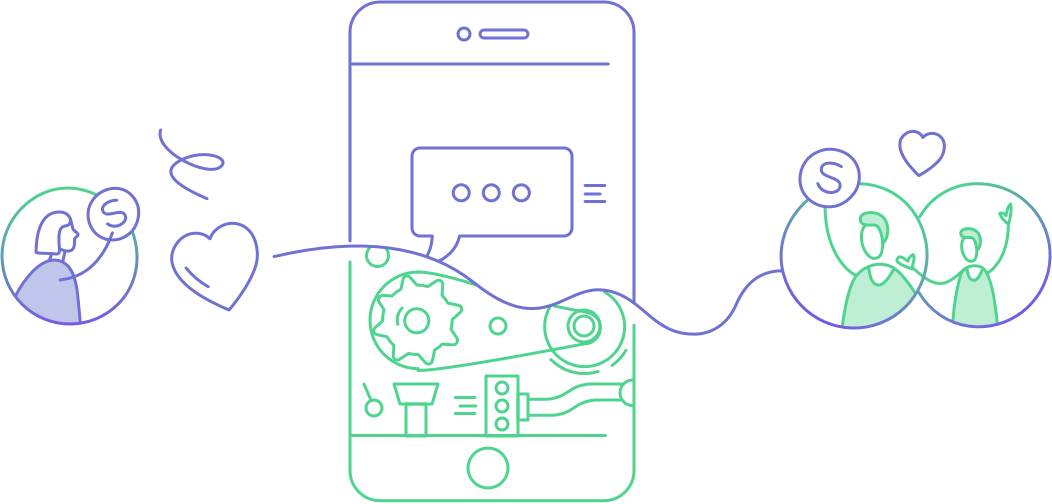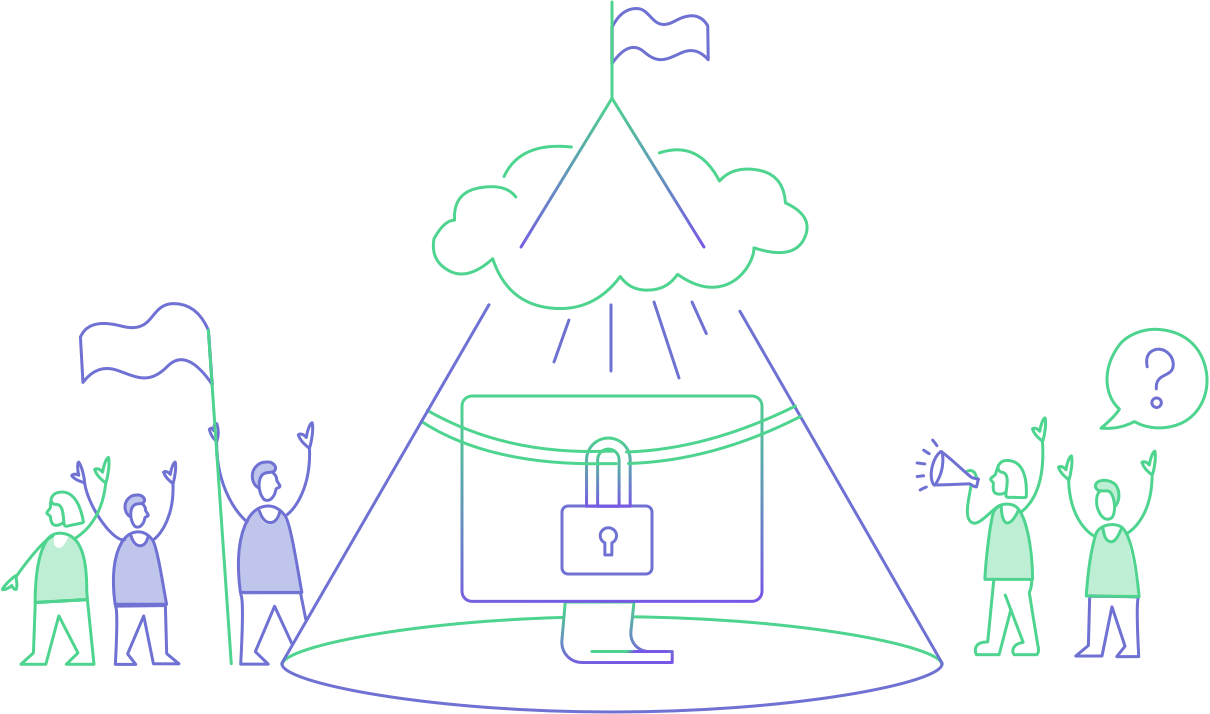Pillars of Decentralization: Freedom of Expression
The key difference of Status is that we build properly decentralized systems. In an age when the problem of not owning your own information is becoming increasingly evident, our community has a clear vision and control over their online interactions.
We have four important reasons to commit to decentralization and the deep technical challenges it poses. We will explain each of these four pillars in detail in the course of this series, beginning with a fundamental human right.
Freedom of expression
The freedom of expression, in a few words, is to allow anyone to investigate or express their opinion on any subject without fear of censorship, sanctions or reprisals. It has a long history in the laws, from the Ancient Athens and Rome, to the Bill of Rights (1689) and the French Revolution (1789); and Article 19 of the Universal Declaration of Human Rights, which states:
"Every individual has the right to freedom of opinion and expression; this right includes not being disturbed because of their opinions, of investigating and receiving information and opinions, and of disseminating them, without limitation of borders, by any means of expression. "
Status started as a group called Syng, named for the inkwell brand used to sign the Declaration of Independence. It has always been about individual empowerment, about giving people the ability to create their own rules from their own pockets, and voluntary organization.
The word declaration means "the formal announcement of the principle of a state or condition," suggesting that the declaration act establishes a standard of the types of freedoms that can be followed.
However, the most important thing is that we want to highlight the fact that the new types of declaration (such as the Declaration of Cyberspace Independence of John Perry Barlow) and the systems in which they feel their premises (such as distributed networks and cryptography) facilitate a new set of rules for what is even possible to express scarcely, freely or not.
Privacy and resistance to censorship
Through optimization for privacy and resistance to censorship, by writing a code declaration that connects users directly instead of central surveillance or failure points, we can facilitate the kind of free trade and exchange of ideas that allows Individuals organize themselves in new and interesting ways.
The decentralized networks that belong to the people who build, use and secure them allow us to protect the ability of these people to express themselves while maintaining their ability to coordinate effectively with others of their interest.
Likewise, the border referred to in Article 19 has been displaced by the technological means that transport values in a native way, which means that our shared software can not only avoid interference when our community seeks, receives or imparts information. It also encourages the use of such information in interesting and valuable ways.
With a global public ledger and an end-to-end encrypted chat operating in the same technical block, we can play a much more transparent game of economics and communication, which still allows a lot more people to participate safely. It is the combination of technologies, and the way in which the Status community has united them, which makes ours an interesting project in which to get involved.
The systems that the vast majority of people use to communicate online are closely monitored and often manipulated by institutions that see people as information points to be exploited instead of viewing them as clients that should be protected. If we can make them attractive, not only conceptually, but also financially, to take care of privacy and to use systems that protect your ability to think and say anything, we can use tags like #BorrarFacebook much more than another passing trend.
Status and freedom of expression
Let's return to that definition of declaration: "the formal announcement of the principle of a state or condition". Since we see what we do as part of the beginning of a new state, we decided to code the phrase "The State of Us" in our brand. We feel that it captures in a more precise way the general vision of Status: bringing people together in a direct way and creating a more open and equitable internet for all of us.
We can not have a more open internet without using the best available tools to protect the ability of people to express themselves freely. By making it possible for you to connect directly to Ethereum from your phone and when using the Whisper protocol, Status puts into practice at a technical level the message we preach in a conceptual manner.
There are no servers between the person you are communicating with and you. Whisper is a user-to-user multicast messaging system that is encrypted end-to-end and can be configured to send "obscure" messages and credible denial. There are no records stored anywhere for any institution to cite, and users can trust that no analog of Cambridge Analytica will have unjustified access to their information.
This highlights Status over any other messaging system available today.
Speak with more than words
However, The State of Us does much more than just make sure your messages stay between you and the people you care about. The same transactions are a type of expression, contracts even more, the same as signing them.
All these modes of expression should be open to anyone, which is why it is so important to run your own light node, sign and transmit your transactions yourself and actively participate in building a more solid and decentralized network for all of us.
Centralized providers may be slightly more convenient in the short term, but systems are defined by the way they are used. We are rapidly learning where optimization for convenience takes us in terms of information security and massive psychological manipulation.
Building systems like the Whisper protocol that promote free expression because they protect privacy and are resistant to censorship allows us to build the kind of tools that give people power and granular control over their digital lives. Each action within Status is executed in such a way that the user is always the supreme arbiter of his own destiny: no one can prevent you from sending to anyone who is a message or transaction of, literally, any type.
In addition, and this is really the key point, running your own light node, along with the benefits that this entails, makes the Ethereum network itself more decentralized and robust.
So by optimizing privacy and resistance to censorship to promote Freedom of Expression we in fact create tools to simultaneously benefit both individuals and the entire Ethereum community. The era of anti-competitive goods has really arrived.
In Status we take this even beyond the product we build and the protocols we use, directly to the way we organize and promote collaboration among all our contributors. We all have the freedom to express what we think and create ideas here. Ideas are evaluated by others who are also free to express what they think. The final result, we hope, is a culture based on volunteering and meritocracy, as well as the rapid distribution of introspection, knowledge and information.
Privacy in times of public networks
"That you do not care about privacy because you have nothing interesting to hide is that you do not mind Free Expression because you have nothing interesting to say" Edward Snowden
Snowden's derisive comment points to an important point about the striking similarities between privacy and Freedom of Expression. You can not express yourself completely if you are worried that certain thoughts or ideas can be traced to you. Using Whisper and the user-to-user network architecture of Ethereum allows us to take advantage of the benefits of a public, immutable ledger shared by everyone and ensure your privacy in "obscure" messages encrypted end-to-end.
Privacy and Freedom of Expression, although related, should not be confused. As has been shown, optimizing for privacy has systemic consequences, only one of them is free expression. However, it is so remarkable that it deserves a full blog post, because technologies to protect privacy are the only way in which we can really implement the old Voltaire maxim in the modern world. "Maybe you do not agree with what you say, but I will defend my right to express it with my life ".
This is not just a matter of realizing that, unless you are part of those who build the kind of world in which you want to live, they will come for you and there will be no one left to speak. Worrying about the way systems are really designed, making sure that there is not a single flaw, and that the tools we offer to people actively protect their privacy means that we can actually build networks that benefit both individuals AND the communities in which they choose to participate.
The State of Us (Our State) is a new condition for the modern era. It is a state based on open communication protocols that allow for types of economic and social organization beyond what is now possible, while ensuring, always, that people who participate can do so without fear of censorship or recrimination based on who they are. or where they are.



like you